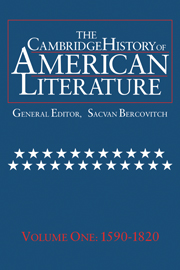Book contents
- Frontmatter
- Introduction
- THE LITERATURE OF COLONIZATION
- 1 The Papers of Empire
- 2 The Natural Inhabitants
- 3 Three Writers of Early America
- 4 Settlements
- 5 The Dispute of the New World
- 6 Traveling in America
- 7 The Final Voyage
- NEW ENGLAND PURITAN LITERATURE
- BRITISH-AMERICAN BELLES LETTRES
- THE AMERICAN ENLIGHTENMENT, 1750–1820
- THE LITERATURE OF THE REVOLUTIONARY AND EARLY NATIONAL PERIODS
- Chronology
- Bibliography
- Index
5 - The Dispute of the New World
from THE LITERATURE OF COLONIZATION
Published online by Cambridge University Press: 28 March 2008
- Frontmatter
- Introduction
- THE LITERATURE OF COLONIZATION
- 1 The Papers of Empire
- 2 The Natural Inhabitants
- 3 Three Writers of Early America
- 4 Settlements
- 5 The Dispute of the New World
- 6 Traveling in America
- 7 The Final Voyage
- NEW ENGLAND PURITAN LITERATURE
- BRITISH-AMERICAN BELLES LETTRES
- THE AMERICAN ENLIGHTENMENT, 1750–1820
- THE LITERATURE OF THE REVOLUTIONARY AND EARLY NATIONAL PERIODS
- Chronology
- Bibliography
- Index
Summary
By 1700, European empires had fully annexed the American continents; by midcentury, a debate over the value of the new acquisition divided the literature of exploration. In that debate, one side offered a “degenerationist” argument to the effect that nature in the New World wilderness had fallen from its proper level, which could only be maintained by cultivation. The other side countered that American nature had been remarkably fertile from pre-Columbian days and that cultivation was only bringing out, not creating, its inherent fertility. Both sides concurred on the necessity of colonizing the New World, of course. But the degenerationists understood colonizing as opening new territories for annexation to the existing European world; the defenders of American nature saw the newly annexed continents as constituting their own world, which might even surpass Europe. The degenerationists were largely Europeans; most of the defenders, already Americans.
The lines drawn in “the dispute of the New World, ” as this controversy is commonly known, extend to map the world of eighteenth-century political and scientific thought as a whole. In the arguments over the worth of New World flora and fauna, it is possible to trace the emergence not only of ideas of America but reciprocally of revised images of Europe as well. Reciprocity is the key term here. It was the central dynamic in a dispute that enacted the culminating moment of the discovery, when the New World fully entered into the worldview of the Old. The early colonial expeditions can be understood incrementally. There was more to the world than had been known; but because the additional portions were accruing to Europe, the enlarged world retained its prior order. Geopolitically at least, the center still held. But the extraordinary vigor of the eighteenth-century dispute concerning the agricultural potential and general desirability of the New World indicates that seismic forces were at play.
- Type
- Chapter
- Information
- The Cambridge History of American Literature , pp. 109 - 125Publisher: Cambridge University PressPrint publication year: 1994

